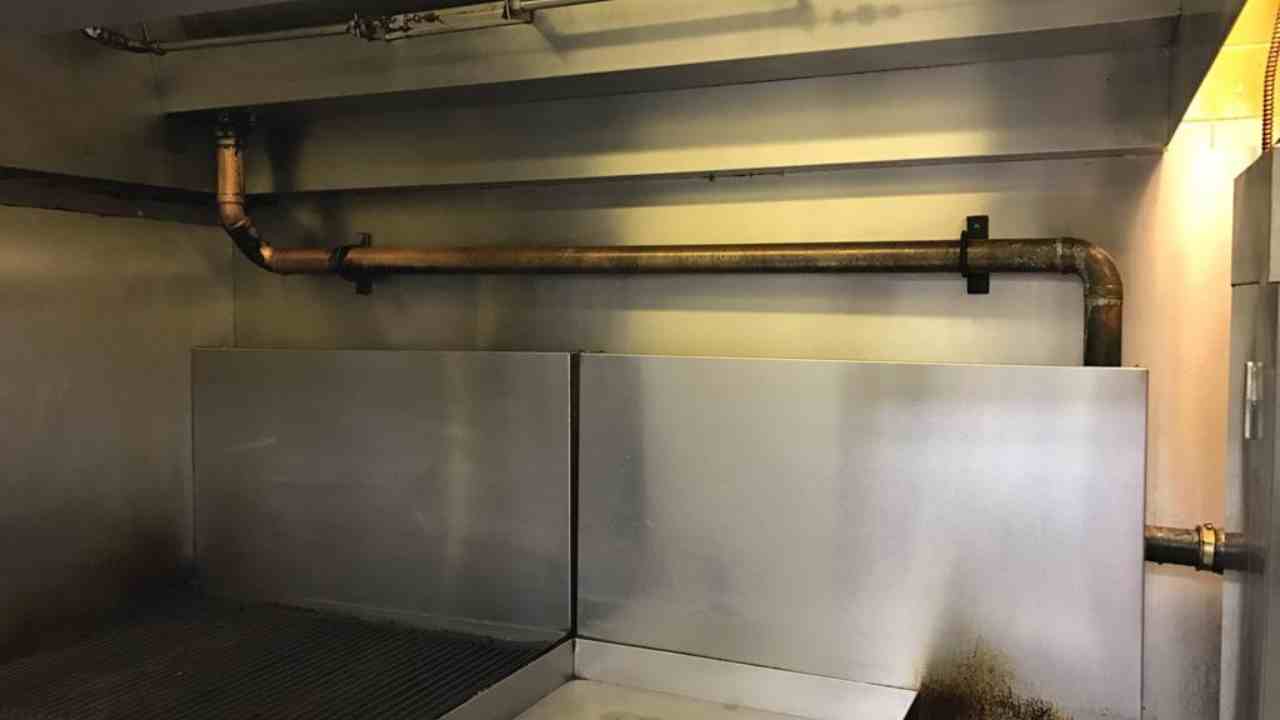How to Determine Kitchen Exhaust Cleaning Intervals

Ontario-wide Kitchen Exhaust and Hood Cleaning – Best prices and service guaranteed.
Keeping a kitchen clean and free from grease buildup is essential for maintaining a safe and healthy environment. One crucial aspect of kitchen cleanliness is the regular cleaning of kitchen exhaust systems. These systems play a vital role in removing smoke, odors, and grease particles from the air, preventing them from accumulating on surfaces and posing a fire hazard. However, determining the appropriate cleaning intervals for kitchen exhaust systems can be challenging. In this article, we will explore the factors to consider when determining kitchen exhaust cleaning intervals and provide valuable insights to help you make informed decisions.
The Importance of Regular Kitchen Exhaust Cleaning
Before delving into the specifics of determining cleaning intervals, it is crucial to understand why regular kitchen exhaust cleaning is essential. Neglecting to clean kitchen exhaust systems can lead to a range of problems, including:
- Increased fire risk: Grease buildup in kitchen exhaust systems is highly flammable. If not cleaned regularly, it can ignite and cause a fire that spreads rapidly throughout the kitchen and beyond.
- Poor air quality: A dirty kitchen exhaust system cannot effectively remove smoke, odors, and grease particles from the air. This can result in poor air quality, leading to discomfort for kitchen staff and potentially affecting the taste and quality of food.
- Health hazards: Grease buildup in kitchen exhaust systems can harbor bacteria, mold, and other harmful microorganisms. These can contaminate the air and surfaces, posing health risks to both employees and customers.
- Reduced efficiency: A clogged or dirty kitchen exhaust system will not function efficiently. This can lead to increased energy consumption, higher utility bills, and decreased overall performance.
Considering these potential risks, it is clear that regular kitchen exhaust cleaning is crucial for maintaining a safe and healthy kitchen environment.
Ontario-wide Kitchen Exhaust and Hood Cleaning – Best prices and service guaranteed.
Factors to Consider When Determining Cleaning Intervals
Several factors should be taken into account when determining the appropriate cleaning intervals for kitchen exhaust systems. These factors include:
Type of Cooking
The type of cooking conducted in the kitchen plays a significant role in determining cleaning intervals. Different cooking methods produce varying levels of grease and smoke. For example, kitchens that primarily use deep fryers or grills tend to generate more grease and require more frequent cleaning compared to kitchens that focus on baking or steaming.
It is essential to assess the cooking methods used in your kitchen and consult with professionals to determine the appropriate cleaning intervals based on the specific grease and smoke production associated with those methods.
Volume of Cooking
The volume of cooking conducted in the kitchen is another crucial factor to consider. Kitchens that experience high cooking volumes, such as those in busy restaurants or large catering facilities, will accumulate grease at a faster rate and require more frequent cleaning.
It is recommended to monitor the cooking volume and assess the grease buildup regularly to determine the appropriate cleaning intervals. This can be done by inspecting the kitchen exhaust system and checking for visible grease accumulation on surfaces and filters.
Local Regulations and Standards
Local regulations and industry standards often provide guidelines for kitchen exhaust cleaning intervals. These regulations and standards are put in place to ensure the safety and cleanliness of commercial kitchens.
It is crucial to familiarize yourself with the specific regulations and standards applicable to your location and industry. These guidelines may specify the minimum cleaning frequency required or provide recommendations based on the type and volume of cooking conducted in your kitchen.
Inspection and Maintenance Schedule
Regular inspections and maintenance of kitchen exhaust systems are essential for identifying potential issues and ensuring optimal performance. During these inspections, it is important to assess the level of grease buildup and determine if cleaning is necessary.
Establishing a comprehensive inspection and maintenance schedule will help you monitor the condition of your kitchen exhaust system and make informed decisions regarding cleaning intervals. This schedule should include regular visual inspections, filter replacements, and professional assessments by qualified technicians.
Ontario-wide Kitchen Exhaust and Hood Cleaning – Best prices and service guaranteed.
Case Studies and Statistics
Several case studies and statistics highlight the importance of determining appropriate cleaning intervals for kitchen exhaust systems. These examples provide valuable insights into the potential risks and benefits associated with regular cleaning.
Case Study 1: Restaurant Fire Prevention
In a study conducted by the National Fire Protection Association (NFPA), it was found that failure to clean kitchen exhaust systems was the leading cause of restaurant fires. The study revealed that 59% of restaurant fires were caused by cooking equipment, with 21% of those fires originating from the kitchen exhaust system.
This case study emphasizes the critical role of regular cleaning in preventing kitchen fires and the importance of determining appropriate cleaning intervals to minimize the risk.
Case Study 2: Improved Air Quality
A study published in the Journal of Occupational and Environmental Hygiene examined the impact of kitchen exhaust cleaning on indoor air quality in commercial kitchens. The study found that regular cleaning of kitchen exhaust systems significantly reduced the concentration of particulate matter, volatile organic compounds (VOCs), and other airborne contaminants.
This case study highlights the positive effects of regular cleaning on air quality and the importance of determining appropriate cleaning intervals to maintain a healthy environment for kitchen staff and customers.
Ontario-wide Kitchen Exhaust and Hood Cleaning – Best prices and service guaranteed.
Determining the appropriate cleaning intervals for kitchen exhaust systems is crucial for maintaining a safe and healthy kitchen environment. Factors such as the type of cooking, volume of cooking, local regulations and standards, and inspection and maintenance schedules should be considered when making these decisions.
Regular cleaning of kitchen exhaust systems helps prevent fire hazards, improves air quality, and ensures optimal performance. By understanding the importance of regular cleaning and considering the factors mentioned in this article, you can make informed decisions regarding cleaning intervals and create a safer and healthier kitchen environment for all.
Learn more about “What is the Ideal Cleaning Frequency for Kitchen Exhaust” right here.
Frequently asked questions about How to Determine Kitchen Exhaust Cleaning Intervals.

What factors should I consider when determining the appropriate cleaning intervals for my kitchen exhaust system?
Several essential factors influence the determination of kitchen exhaust cleaning intervals. These include the type of cooking conducted in your kitchen, the volume of cooking, the type of exhaust system in place, and the local health and fire safety regulations. Greasy and high-heat cooking processes, such as frying and grilling, tend to generate more grease buildup, necessitating more frequent cleaning. Similarly, higher cooking volumes and heavy usage demand more frequent cleaning to maintain ventilation efficiency and safety. Consulting with professional kitchen exhaust cleaners can help you analyze these factors and establish an appropriate cleaning schedule tailored to your specific kitchen’s needs.
Is there a recommended guideline for determining kitchen exhaust cleaning intervals based on cooking volume or the number of meals served?
While there isn’t a one-size-fits-all guideline, a rough estimation for determining kitchen exhaust cleaning intervals based on cooking volume can be considered. For high-volume commercial kitchens serving three meals a day, cleaning every three months may be suitable. For medium-volume establishments, such as cafes or casual restaurants, cleaning every four to six months might suffice. Smaller kitchens with low cooking volumes or seasonal operations may opt for cleaning every six to twelve months. Remember, these are general estimates, and consulting with a professional cleaning service will provide a more accurate and personalized schedule.
Can the location and climate of my restaurant affect the frequency of kitchen exhaust cleaning?
Yes, the location and climate of your restaurant can impact the frequency of kitchen exhaust cleaning. Restaurants located in humid regions may experience more rapid grease accumulation due to moisture promoting adhesion to exhaust surfaces. Similarly, restaurants in coastal areas might face additional challenges with salt-air, which can exacerbate grease buildup. In such cases, more frequent cleaning intervals, such as every three to four months, may be necessary to prevent clogs and maintain proper ventilation.
Are there any technological advancements or monitoring systems available to help determine kitchen exhaust cleaning intervals more accurately?
Yes, advancements in exhaust system monitoring technology can aid in determining kitchen exhaust cleaning intervals more accurately. Some modern exhaust systems are equipped with sensors that measure airflow, temperature, and grease accumulation levels. These data-driven monitoring systems can provide real-time information about the condition of the exhaust system, helping kitchen operators and cleaning professionals make informed decisions about cleaning schedules. By analyzing the system’s performance data, you can optimize cleaning intervals, reduce energy waste, and ensure the exhaust system operates efficiently.
Can I extend the cleaning intervals if my kitchen exhaust system includes a self-cleaning feature or automatic cleaning functions?
While self-cleaning or automatic cleaning features in kitchen exhaust systems can help maintain cleanliness, they generally cannot replace professional cleaning entirely. These features may provide some level of convenience and help prevent excessive grease buildup in between professional cleanings. However, they do not thoroughly clean all components of the exhaust system, such as ductwork and exhaust fans. It’s essential to follow the manufacturer’s recommendations for maintenance and still schedule regular professional cleanings to ensure complete and compliant exhaust system maintenance.
- hood cleaning
- How to Determine Kitchen Exhaust Cleaning Intervals
- kitchen exhaust cleaning
- restaurant hood cleaning







